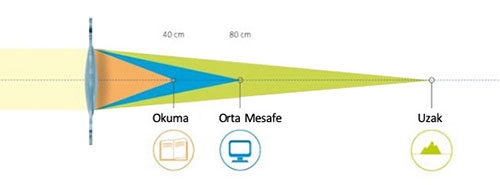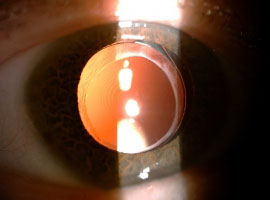
70% of our eye's focusing power comes from the cornea layer, which is like a watch glass, and the remaining 30% is provided by our eye lens. When we are young, our eye lens has the ability to change its focusing power as needed, allowing us to focus both close and far. However, this ability to change focus decreases after the age of 45, and difficulties in close-up vision and reading begin. People have to wear reading glasses to read up close.
As we age, the focusing capacity of the lens diminishes further, losing its transparency and leading to cataract formation. Both near and far vision become impaired. Sometimes, during the development of cataracts, patients whose distance vision is affected can see close-up without glasses for a period, but this is a temporary condition and a sign that the cataract is progressing.
The treatment for cataracts involves melting and removing the impaired lens through surgery and replacing it with an artificial lens. Artificial lenses, or intraocular lenses, are devices made of plastic that are implanted into the eye and replace the cataract for a lifetime. There are various types, including single-focus ones that provide clear vision for distance while requiring additional focusing power for near vision through reading glasses.
In recent years, lenses advertised as smart lenses are actually intraocular lenses with three focuses. These lenses, with their three focuses, allow for clear vision without glasses at far, intermediate (for looking at computers and phones),and near (reading) distances, essentially combining three different lenses into one.
Video: Prof. Dr. Ahmet AkmanMultifocal Lens Surgery TurkeyAll Videos
In our country, smart lenses are described by some private eye centers as a miracle. Are the facts as they are told? I will try to answer your questions.
Firstly, lenses referred to as smart lenses are not called smart lenses anywhere in the world; this is an unethical marketing method introduced in our country. These lenses do not have any intelligence; they simply have a trifocal structure resembling three different lenses.
The so-called trifocal lenses, referred to as smart lenses, are a type of lens implanted in patients whose own lens has deteriorated due to cataracts, typically those over the age of 50. These trifocal lenses allow cataract surgery patients to see at near, intermediate, and far distances without the need for glasses.
In exceptional cases, patients aged 40-50 who experience deterioration in near vision and require reading glasses before cataract formation can also have these lenses implanted after cataract surgery. This method is the only option for patients over 40 who do not want to use both near and far glasses because procedures like LASIK are not suitable for this age group.
If a person's vision is not impaired for distance, i.e., they are not myopic, they will lose their near vision after the age of 45-50. No current method or surgery can provide the near vision quality we had in our youth without impairing distance vision. While smart lenses allow for unaided near vision, they can also cause problems such as contrast loss in distance vision and light scattering at night. Therefore, it is crucial to obtain accurate information along with suitability assessments for your eyes.
When applied by experienced and ethical doctors who adhere to the correct measurements and principles, smart lenses can make patients very happy. However, when applied inappropriately for commercial reasons or at a young age, they can lead to serious vision problems. My recommendation to those considering such surgery is to consult experts with academic backgrounds who approach the topic in a medically ethical manner, prioritizing patient benefits over commercial interests.
Remember, your remaining vision for the rest of your life depends on this surgery, and there is no turning back from it.
The first to apply these types of lenses in our country, providing training to many doctors on their application, and having international publications recommended by the American Academy of Ophthalmology and the American Society of Cataract and Refractive Surgery, as a professor of ophthalmology, I recommend that you first have an examination to learn about the benefits and risks of these lenses and then make a decision accordingly.
The most frequently asked question is about the cost of these lenses. It is neither ethical nor legal to provide suitability or price information for a patient we have not examined. By contacting us and having an examination, you enable us to determine the suitability of these lenses for your eyes based on measurements and inform you face-to-face about their pros and cons.
The intraocular smart lens treatment involves replacing single-focus intraocular lenses with the above-mentioned multi-focal lenses during cataract surgery. This allows patients to live without glasses after cataract surgery.
 Two Trifocal Lens Focus Distances
Two Trifocal Lens Focus Distances
In another application, for individuals over 45 who do not want to use glasses, the "clear lens extraction" method involves early cataract surgery, even if cataracts have not yet developed, followed by the placement of a smart tri-focal intraocular lens. This method is the only way for individuals over 45 to see near, intermediate, and far distances without glasses.
Smart lens surgery is a cataract surgery performed using the phacoemulsification method. In patients with cataracts, instead of a standard single-focus lens, a multi-focal smart lens is implanted.
For patients over 45 who do not have cataracts but do not want to use glasses, the same surgery and lens application are performed to provide a glasses-free life.
The success of this surgery depends on meticulous preoperative measurements, accurate calculation of the lens number by an experienced doctor, and the use of clean disposable materials in a careful and clean hospital.
Prof. Dr. Ahmet Akman has been applying smart (tri-focal) lenses to his patients for years, teaching about these lens applications at international conferences and congresses. His scientific publications on smart lenses have been recommended by the American Academy of Ophthalmology for American doctors to read on his website as editor's choice. He provides services in cataract surgery and smart lens applications at his clinic in Ankara.
 Intraocular Smart Trifocal Lens
Intraocular Smart Trifocal Lens
Smart lenses come in various prices depending on whether they are regular or astigmatic, their prescription, and the brand. However, the total cost of the surgery is important because they are placed in the eye during cataract surgery.
In centers where the surgery is performed by an experienced surgeon at the level of an academician, using FDA-approved smart lenses, with the use of disposable materials and protective equipment and devices manufactured in the USA or Europe, more than 50% of the surgeon's cost is the cost of materials and lenses. Lower prices can be applied if materials produced in the Far East or India are used, some materials are not disposable, or some eye-protective drugs are used less or of lower quality. While trying to save a few thousand liras on this surgery, problems that can result in lifelong vision loss can occur. The cost of correcting these problems can be very high and sometimes impossible. The investment you make in your eyes will reflect on the quality of your vision for the rest of your life. Our most sensitive sensory organ deserves the highest quality materials and the best surgical conditions in the world.
The application of smart trifocal lenses in cataract surgery is becoming increasingly widespread. In fact, it is the ideal option for anyone whose eye is suitable.
However, due to costs and the fact that it is not fully covered by the SGK (Social Security Institution) in our country, it is still applied in a small portion of surgeries. For patients who want to cover the cost, if it is suitable for their eye, it is the best option.
If applied to unsuitable eyes, problems such as reduced vision quality, light halos, glare at night, and similar issues can occur. Experienced surgeons who frequently apply smart trifocal lenses, such as Prof. Dr. Ahmet Akman, can easily decide during the examination who should definitely not receive them.
After cataract surgery, they enable individuals to see near, intermediate, and far distances without glasses. Especially when the phone rings, when trying to read a price at the market, or when reading a book at home, they do not have to search for their reading glasses.
Contact lenses are placed externally on the eye, unlike intraocular lenses, which are implanted surgically. Contact lenses also have bifocal options. Those over 45 who use contact lenses for distance vision do not need to wear reading glasses on top of these lenses when provided with such bifocal contact lenses. They can also see up close with the same contact lens.
Smart lenses can also be applied to myopia. However, this application is preferred for those over 45. In young myopic individuals, LASIK surgery performed with an excimer laser, as it is an external eye surgery with low risks, is the first choice.
Primarily, it is applied to individuals who will undergo cataract surgery and whose eyes are suitable. Your doctor will decide which eye is suitable during the examination. It is also applied to those over 45 who are not cataract patients but want to get rid of their glasses for near and far distances.
You can find the comments of our patients who have been applied smart lens on our website and in our videos.
You can call us immediately for detailed information, consultation or appointment.
Contact information